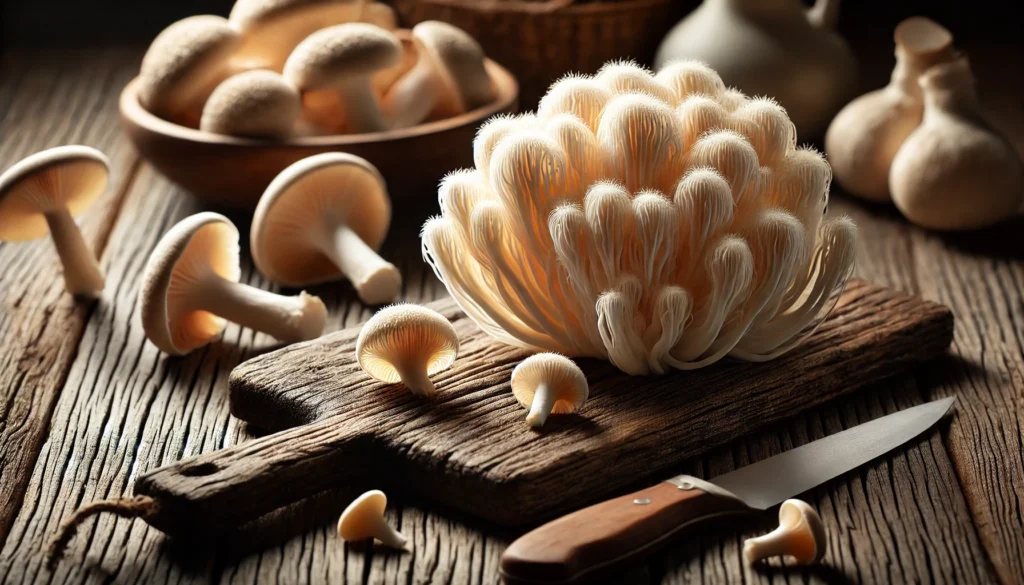Introduction
Lion’s Mane mushrooms (Hericium erinaceus) have gained significant attention in the world of cognitive enhancement due to their potential neuroprotective and brain-boosting properties. As a natural nootropic, they are widely used to support memory, focus, and nerve regeneration. However, many individuals interested in optimizing their mental performance often ask an important question: how to eat Lion’s Mane mushrooms in a way that maximizes their benefits? The method of consumption, preparation, and even the time of day can all influence how effective these mushrooms are in promoting cognitive function.
You may also like: Unlocking the Cognitive Benefits of Lion’s Mane: How This Powerful Mushroom May Help With ADHD and Brain Fog
Understanding how to eat Lion’s Mane properly requires knowledge of its bioactive compounds, best preparation methods, and dietary synergies that enhance absorption. Whether you prefer fresh mushrooms, dried extracts, or supplements, there are numerous ways to incorporate Lion’s Mane into your routine. In this comprehensive guide, we will explore the best ways to consume Lion’s Mane mushrooms, discuss the science behind their effects on the brain, and provide practical tips for optimizing their benefits. If you have been curious about how to eat Lion’s Mane mushrooms for cognitive enhancement, this article will serve as your definitive resource.
Understanding the Cognitive Benefits of Lion’s Mane
Lion’s Mane mushrooms contain bioactive compounds known as hericenones and erinacines, which have been shown to stimulate the production of nerve growth factor (NGF). NGF plays a crucial role in the growth, repair, and maintenance of neurons, making it essential for cognitive function. Research suggests that consuming Lion’s Mane regularly may support neurogenesis, enhance memory, and reduce brain fog, making it a valuable natural tool for brain health.
In addition to its neuroprotective properties, Lion’s Mane may also offer benefits for individuals struggling with mild cognitive impairment, stress, and anxiety. Some studies indicate that its compounds have anti-inflammatory effects on the brain, helping to protect against oxidative stress and neurodegeneration. As more research emerges, the potential applications of this remarkable mushroom continue to expand, solidifying its status as a premier cognitive-enhancing supplement. Given these benefits, knowing how to eat Lion’s Mane mushrooms in the most effective way is key to unlocking their full potential.

How to Eat Lion’s Mane Mushrooms: Fresh vs. Dried vs. Extracts
There are multiple ways to consume Lion’s Mane, each with its own advantages. Fresh Lion’s Mane mushrooms can be cooked and enjoyed as a culinary delicacy, while dried mushrooms and extracts offer more concentrated doses of its bioactive compounds. The best method of consumption depends on individual preferences, dietary habits, and convenience.
Cooking Fresh Lion’s Mane Mushrooms
For those who enjoy culinary experimentation, fresh Lion’s Mane mushrooms can be a delicious and nutritious addition to meals. These mushrooms have a naturally meaty texture and a mild, seafood-like flavor, making them a great substitute for crab or lobster in plant-based dishes. When cooking fresh Lion’s Mane, it is best to sauté them in a small amount of healthy fat, such as olive oil or butter, to enhance the absorption of fat-soluble compounds.
Cooking does not significantly degrade the beneficial compounds in Lion’s Mane, making it a viable option for those who prefer whole-food sources of nootropics. In fact, the heat may even help break down the mushroom’s fibrous structure, making certain nutrients more bioavailable. Consuming fresh Lion’s Mane regularly in meals can be an enjoyable way to integrate this cognitive-enhancing mushroom into a balanced diet.
Using Dried Lion’s Mane
Dried Lion’s Mane mushrooms offer a more convenient way to consume this superfood, especially for those who do not have access to fresh varieties. These mushrooms can be rehydrated and used in soups, teas, or blended into smoothies. Some individuals prefer to grind dried Lion’s Mane into a fine powder and mix it into coffee or herbal drinks.
One of the primary advantages of using dried Lion’s Mane is that it allows for long-term storage while retaining most of its beneficial compounds. By incorporating dried mushrooms into daily routines, users can maintain a consistent intake of cognitive-supporting nutrients. However, it is important to source high-quality dried mushrooms from reputable suppliers to ensure potency and purity.
Consuming Lion’s Mane Extracts and Supplements
For those seeking a concentrated and highly bioavailable form of Lion’s Mane, extracts and supplements are an excellent option. These products are typically available in capsule, powder, or tincture form and are designed to deliver a standardized dose of the mushroom’s active compounds. Extracts often undergo a dual-extraction process, which enhances their potency by isolating both water-soluble and fat-soluble compounds.
When choosing a Lion’s Mane supplement, it is essential to check for third-party testing and quality certifications to ensure purity and effectiveness. Taking extracts consistently can provide a more predictable and measurable way to reap the cognitive benefits of this mushroom. Understanding how to eat Lion’s Mane mushrooms in supplement form is particularly useful for individuals who want a no-fuss approach to cognitive enhancement.

Enhancing Lion’s Mane Absorption: Best Dietary Practices
The way Lion’s Mane is consumed can significantly impact its absorption and effectiveness. Pairing the mushroom with complementary foods can enhance its bioavailability and maximize its benefits. Because some of its key compounds are fat-soluble, consuming Lion’s Mane with healthy fats can improve absorption. Foods such as avocado, nuts, coconut oil, and grass-fed butter make excellent pairings.
In addition to dietary pairings, the timing of consumption can also play a role. Some individuals report greater cognitive benefits when taking Lion’s Mane in the morning, as it helps promote focus and mental clarity throughout the day. Others prefer to consume it in the evening to support neuroprotection and relaxation. Experimenting with different timings can help determine the best approach for individual needs.
Frequently Asked Questions (FAQ) on How to Eat Lion’s Mane Mushrooms for Maximum Cognitive Benefits
1. What is the best way to prepare fresh Lion’s Mane mushrooms for cognitive benefits?
The best way to prepare fresh Lion’s Mane mushrooms depends on how you want to incorporate them into your diet. Many people prefer sautéing them in a healthy fat like olive oil, butter, or coconut oil to enhance absorption of their bioactive compounds. Cooking them at a moderate temperature helps preserve the beneficial compounds while making them more digestible. Some chefs recommend tearing them into smaller pieces before cooking to improve texture and increase surface area for better nutrient release. If you want to experiment with different flavors, you can also try roasting or making a Lion’s Mane mushroom tea to enjoy their neuroprotective effects in liquid form.
2. How do I eat Lion’s Mane mushrooms if I don’t like the taste?
For those who find the taste of Lion’s Mane mushrooms too strong, there are several ways to mask or neutralize their flavor. One approach is blending them into soups, stews, or sauces where their natural umami flavor enhances the dish without overpowering it. Another option is to grind dried Lion’s Mane into a fine powder and mix it into smoothies, coffee, or herbal teas. Some people prefer to take it in capsule or tincture form, which removes the need for cooking altogether. Experimenting with different preparation methods, such as combining them with aromatic herbs or spices, can also make them more palatable.
3. How often should I eat Lion’s Mane mushrooms for cognitive support?
Consistency is key when consuming Lion’s Mane mushrooms for cognitive benefits, as their effects build over time. Most research suggests taking them daily for several weeks to experience noticeable improvements in memory, focus, and brain function. If using fresh or dried mushrooms, consuming a serving of 3 to 5 grams per day is a good starting point. If using an extract or supplement, follow the dosage recommendations on the label, typically ranging from 500 mg to 2,000 mg per day. Adjusting your intake based on personal experience and cognitive needs can help optimize results over time.
4. Can I eat Lion’s Mane mushrooms raw, or do they need to be cooked?
While it is possible to eat Lion’s Mane mushrooms raw, cooking is generally recommended to break down their fibrous structure and improve digestibility. Cooking can enhance the availability of key compounds like hericenones and erinacines, which support nerve growth factor (NGF) production. Additionally, lightly cooking them in a small amount of healthy fat may improve absorption of fat-soluble nutrients. If you prefer to consume them raw, try blending them into a smoothie or finely chopping them into salads to make them easier to digest. However, most people find that cooked Lion’s Mane mushrooms have a more enjoyable texture and flavor compared to their raw counterpart.
5. What is the best time of day to eat Lion’s Mane mushrooms for brain function?
The best time of day to eat Lion’s Mane mushrooms depends on your cognitive goals. If you want to boost focus and mental clarity, consuming them in the morning with breakfast can provide sustained benefits throughout the day. Some people also find that taking Lion’s Mane in the early afternoon helps prevent midday brain fog and supports productivity. Alternatively, if you are using Lion’s Mane to promote neuroprotection and relaxation, consuming it in the evening may enhance overnight neural repair and improve sleep quality. Experimenting with different times can help you determine what works best for your individual cognitive needs.
6. Can Lion’s Mane mushrooms be mixed with other nootropics or supplements?
Yes, Lion’s Mane mushrooms can be safely combined with other nootropics and supplements to enhance cognitive performance. Many people stack Lion’s Mane with adaptogens like Rhodiola Rosea or Ashwagandha to improve stress resilience and mental clarity. Combining it with choline sources, such as Alpha-GPC or citicoline, may further support memory and focus. Some users also mix Lion’s Mane with caffeine for a more sustained and jitter-free energy boost. When stacking supplements, it’s important to start with lower doses and adjust based on your individual response.
7. Does cooking Lion’s Mane mushrooms reduce their cognitive benefits?
Cooking Lion’s Mane mushrooms does not significantly reduce their cognitive benefits, as most of their key compounds remain stable under moderate heat. In fact, cooking can help release beneficial nutrients that are otherwise locked within the mushroom’s fibrous structure. However, excessive heat or prolonged cooking times may degrade some delicate bioactive compounds. To maximize benefits, sauté or lightly cook Lion’s Mane at medium heat rather than boiling or frying at high temperatures. If you prefer to consume it in a more concentrated form, extracts and tinctures offer an alternative way to get a standardized dose of its active compounds.
8. Can Lion’s Mane mushrooms help with brain fog, and how should they be consumed for this purpose?
Lion’s Mane mushrooms are widely used to combat brain fog by promoting mental clarity and reducing inflammation in the brain. To maximize their effects, it’s best to take them consistently over time, either in cooked form, as a supplement, or in tea. Many people find that pairing Lion’s Mane with healthy fats like MCT oil or grass-fed butter improves cognitive benefits by enhancing absorption. Drinking Lion’s Mane tea in the morning can provide a gentle, sustained mental boost without the crash associated with caffeine. If brain fog is a chronic issue, combining Lion’s Mane with other lifestyle strategies such as proper hydration, exercise, and mindfulness can further enhance cognitive function.
9. Are there any side effects associated with eating Lion’s Mane mushrooms?
Lion’s Mane mushrooms are generally well-tolerated, but some individuals may experience mild digestive discomfort, such as bloating or an upset stomach, especially when consuming them in large amounts. People with mushroom allergies should exercise caution, as allergic reactions to Lion’s Mane are rare but possible. Some users also report experiencing vivid dreams after consuming Lion’s Mane regularly, which may be linked to its effects on nerve growth and brain function. If any side effects occur, reducing the dosage or switching to a different preparation method may help alleviate symptoms. As with any supplement, consulting a healthcare professional before starting a new regimen is advisable, particularly for those with existing health conditions or taking medications.
10. What are some creative ways to eat Lion’s Mane mushrooms besides cooking them?
For those looking to explore innovative ways to incorporate Lion’s Mane into their diet, there are several creative options beyond traditional cooking. One popular method is making Lion’s Mane mushroom coffee by blending its powder or extract with a regular coffee or latte. Some individuals use Lion’s Mane in homemade energy bars or protein shakes, combining it with nuts, dates, and cacao for a nutrient-dense snack. Another option is fermenting Lion’s Mane into a probiotic-rich drink, similar to kombucha, which may enhance gut and brain health. Additionally, infusing Lion’s Mane into broths or soups allows for a slow extraction of its beneficial compounds over time. Finding enjoyable and practical ways to eat Lion’s Mane mushrooms ensures long-term adherence to a brain-boosting routine.

Conclusion: Optimizing Lion’s Mane for Cognitive Enhancement
Lion’s Mane mushrooms offer a powerful and natural way to support cognitive function, memory, and overall brain health. Understanding how to eat Lion’s Mane mushrooms properly ensures that users maximize its neuroprotective benefits and enjoy its full potential. Whether consumed fresh, dried, or in extract form, integrating this functional mushroom into a daily routine can lead to noticeable improvements in mental clarity and long-term brain function.
Choosing the right preparation method, combining Lion’s Mane with complementary foods, and maintaining consistency are all key factors in optimizing its effects. As research into this incredible mushroom continues, its role in cognitive enhancement and neuroprotection is likely to become even more widely recognized. By incorporating these strategies, individuals can make informed choices on how to eat Lion’s Mane in the most effective way possible, ensuring that they reap the full spectrum of its cognitive benefits.
brain-boosting foods, medicinal mushrooms for brain health, natural cognitive enhancers, functional mushrooms benefits, mushroom supplements for memory, nootropic mushrooms, brain fog remedies, mental clarity superfoods, neurogenesis support, adaptogenic mushrooms, natural brain health solutions, best mushrooms for focus, mushroom-based nootropics, holistic brain nutrition, natural remedies for memory loss, herbal supplements for cognition, enhancing mental performance naturally, superfoods for brain power, brain-supporting fungi, longevity and cognitive health
Further Reading:
How to Eat Lion’s Mane: 4 Quick Recipes + Tips
How To Use Lion’s Mane For Max Benefits: 2024 Guide
Diabetes, obesity and heart issues: How Lion’s Mane Mushrooms helps you
Important Note: The information contained in this article is for general informational purposes only, and should not be construed as health or medical advice, nor is it intended to diagnose, prevent, treat, or cure any disease or health condition. Before embarking on any diet, fitness regimen, or program of nutritional supplementation, it is advisable to consult your healthcare professional in order to determine its safety and probable efficacy in terms of your individual state of health.
Regarding Nutritional Supplements Or Other Non-Prescription Health Products: If any nutritional supplements or other non-prescription health products are mentioned in the foregoing article, any claims or statements made about them have not been evaluated by the U.S. Food and Drug Administration, and such nutritional supplements or other health products are not intended to diagnose, treat, cure, or prevent any disease.


